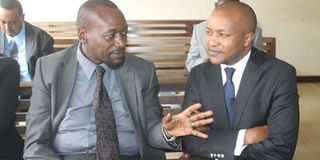Audit report says poll agency ignored its procurement laws

Lawyers Andrew Wandabwa (left), for Ezra Chiloba, and Stephen Gitonga, for three IEBC commissioners, at the Employment and Labour Relations Court in Nairobi on April 13, 2018. PHOTO | PAUL WAWERU | NATION MEDIA GROUP
What you need to know:
- The audit report dated April 5 shows the basis of the protracted Chiloba-Chebukati battle that has now spilled over to the corridors of justice.
- The report, filed in court by suspended chief executive Ezra Chiloba, also points to instances where IEBC paid for goods meant for the elections, but which were delivered after the polls.
Employment and Labour relations court judge Stephen Radido declined to issue temporary orders to lift Mr Chiloba’s three months compulsory leave, which was subject to an April 6 internal memo.
An internal audit report by the electoral commission has exposed how the agency failed to adhere to its own plenary resolutions, as well as procurement laws and procedures in the purchase of various goods and services for last year’s elections.
The report, filed in court by suspended chief executive Ezra Chiloba, also points to instances where the Independent Electoral and Boundaries Commission (IEBC) paid for goods meant for the elections, but which were delivered after the polls had been concluded.
The gist of the Chiloba case, in which he is seeking to overturn his three-month suspension by chairman Wafula Chebukati, boils down to differences between the two IEBC heads over the manner in which the commission handled five tenders.
LABOUR RELATIONS
Yesterday, the Employment and Labour relations court judge Stephen Radido declined to issue temporary orders to lift Mr Chiloba’s three months compulsory leave, which was subject to an April 6 internal memo.
According to the judge, there are factual questions between IEBC commissioners that needed to be contested hence there is no need to lift Mr Chiloba’s suspension at this stage.
“The dispute presented in court reveals a complex clash between powers of an employer under the common law and the constitutional protection accorded to public officers,” ruled Justice Radido.
The five disputed tenders that are at the centre of the case are: the provision of the Kenya Integrated Election Management System (Kiems) by OT Morpho, the provision of satellite phones as part of the Results Transmission System, the servers by IBM to host the Biometric Voter Register, the hosting of the Kiems database and the provision of communication services by Scanad.
COMMISSIONERS
And even though the audit report dated April 5, signed by Mr George Ong’udi, Ms Gladys Mwangi, Mr Fred Kariuki, Mr Reuben Chirchir and Mr Obadiah Keitany, does not lay blame on any of the commissioners, it lays the basis of the protracted battle that has now spilled over to the corridors of justice.
But the audit report’s conclusion also lays emphasis on the contracts that touch on the 553 satellite modems and provision of BVR, BBM server infrastructure, maintenance and infrastructure security monitoring solution as ones which were delivered out of time.
IEBC allegedly acquired 1,553 devices out of time for results transmission from Airtel Kenya yet the mobile operator had indicated it would only deliver 1,000.
AFFIDAVITS
Under the observations made in each of the tenders, there are two instances which the accounting officer has been tasked with explaining the issues raised. These were in the Kiems contract and the IBM one.
In sworn affidavits by Mr Chiloba, he points a finger at Mr Chebukati for being ‘determined to get him out’.
He alleges that the internal audit was conducted to implicate him in the Auditor-General’s report as well.
The memo suspending Mr Chiloba only stated that he was being sent on ‘compulsory leave’ pending audit of all major procurements relating to the 2017 General and Fresh Presidential Elections’.
COMPULSORY LEAVE
The case will be heard on May 7 when the sued parties would have responded to his claims.
Mr Chiloba wanted the sued parties barred from implementing the purported decision to send him on compulsory leave or hindering him from carrying out his functions as well as subjecting him to any form of victimisation or professional dishonour.
IEBC’s vice chair Maina disassociated herself from the resolution to suspend Mr Chiloba.





